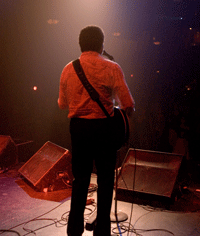‘Nobody expects this to be a quiet neighbourhood,’ just not bone-rattling
By Anisa Lancione –
 Frustrated Harbourfront residents have taken the loud by the speakers by launching a noise survey and campaign to force action from the city’s noise control office.
Frustrated Harbourfront residents have taken the loud by the speakers by launching a noise survey and campaign to force action from the city’s noise control office.The campaign is spearheaded by the York Quay Neighbourhood Association (YQNA) which represents the more than 10,000 people residing in the area plagued by increasing levels of noise from airplanes and party boats, mega concerts on Toronto Island, and Harbourfront Centre’s open stages and tents.
Harbourfront Centre attracts 12 million visitors a year and it is the largest outdoor music venue in Toronto. In the last 10 years, it has become a close and usually good neighbour to the most densely populated area in the city. Despite its importance as a tourist attraction, Harbourfront is still subject to the city’s noise bylaws, which read: “No person shall make, cause or permit noise or vibration at any time, which is likely to disturb the quiet, peace, rest, enjoyment, comfort or convenience of inhabitants of the city.”
Adam Vaughan spurred the campaign forward. He says the city’s Municipal Licensing and Standards (MLS) office, which is responsible for noise control, will only act on complaints from residents and does not monitor or enforce the city’s noise bylaws on their own. Despite many noise complaints in the past, as well as meetings between YQNA, MLS, council and Bill Boyle, CEO of Harbourfront Centre, the improvements that have been made have not solved the problem.
Some concerts are so loud that residents are forced to close their windows and wear earplugs inside their homes to block out the concerts and thumping bass. One man in the Riviera measured 93 decibels inside his condo during a recent Luminato event.
The sound at the open concert stages has been measured by residents to be well above 100 decibels. At this level, hearing can be damaged with even short exposures.
People as far away as Toronto Islands have complained about Harbourfront concerts, sparking calls for the Good Neighbour policy, struck by Kyle Rae, which limits sounds at the sidewalk around the Yonge-Dundas Square to 85 decibels, to be extended to other areas of Downtown.
Harbourfront’s large outdoor Sirius Stage has more than 120 concerts at each summer, compared to around 30 each at the Molson Amphitheatre and Yonge- Dundas Square. The waterfront also has more than 20 party boats with amplified music and mega-concerts on the Island that impact the main land.
“If Kingswood at Wonderland, a privately held outdoor venue, is required to sound-proof their stage to protect new residential developments, why can’t the city require Harbourfront Centre to mitigate its noise impact on our residents?” wonders Cathy Waiten, chair of YQNA’s noise committee.
In past years, YQNA had negotiated a noise solution. The area experienced some improvement in 2007, but the association is continuing to call for monitoring of noise levels. Boyle, Vaughan and MLS report that there have been no new complaints in the community, which is why yqna.ca offers visitors a way to file a noise complaint that is recorded by both YQNA and MLS.
These complaints will not fall on deaf ears. Waterfront residents find it odd that they are responsible for monitoring concerts to make them comply with the city’s noise bylaws. They expect the city’s noise control and the venue operators to be responsible for monitoring and controlling the sound and enforcing the noise bylaws, as they do in other large cities.
Last summer, MLS measured the sound at Harbourfront only twice and at ground level. The residents counter that everyone knows that sound travels up, and on the waterfront the tall condo buildings receive sound like an acoustical shield. Despite Boyle’s limiting the Harbourfront Centre stage to 90 decibels, residents believe that limit is often being ignored, aggravating households to the west and north of the stage.
Residents propose that concerts at 90 decibels are reasonable if the speakers are directed at the venue. Everybody around the stage will hear perfectly well, they argue, and nobody will risk their hearing and more people will be attracted to the music.
“People want to live on the waterfront because of the great Downtown location with beautiful views and the many tourist attractions,” says Ulla Colgrass, chair of YQNA. “Nobody expects this to be a quiet neighbourhood, so music in the background is just fine, but not extremely loud concerts that would not be tolerated anywhere else in the city. People here are great supporters of Harbourfront and attend their events year around. Several of our members are Harbourfront volunteers and we enjoy their eclectic programming,” she says.
If you are bothered by excessive noise from Harbourfront Centre concerts, you can help lower the sound by filling out a noise form at www.yqna.ca. Your message will go to both YQNA and City officials.
 TheBulletin.ca Journal of Downtown Toronto
TheBulletin.ca Journal of Downtown Toronto

